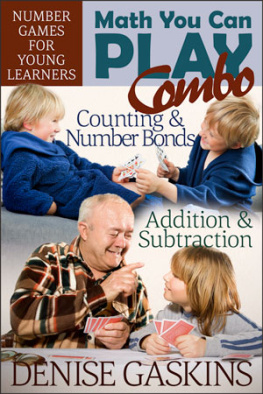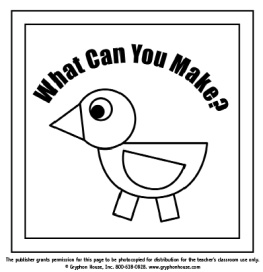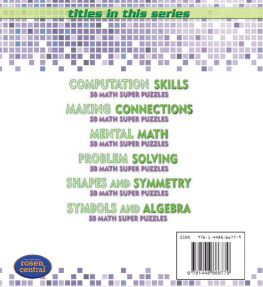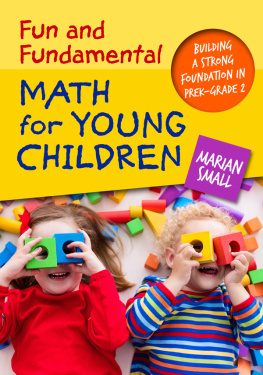.


Copyright 2020 by Antonia Cameron
All rights reserved. This e-book is intended for individual use only. You can print a copy for your own personal use and you can access this e-book on multiple personal devices (i.e. computer, e-reader, smartphone). You may not reproduce digital copies to share with others, post a digital copy on a server or a website, make photocopies for others, or transmit in any form by any other means, electronic or mechanical, without permission from the publisher.
Every effort has been made to contact copyright holders and students for permission to reproduce borrowed material. We regret any oversights that may have occurred and will be pleased to rectify them in subsequent reprints of the work.
Image in by Elli Stattaus from Pixabay.
Painting used in .
Library of Congress Cataloging-in-Publication Data:
Names: Cameron, Antonia, author.
Title: Early childhood math routines : empowering young minds to think / Antonia Cameron with Patricia Gallahue and Danielle Iacoviello.
Identifiers: LCCN 2019036356 (print) | LCCN 2019036357 (ebook) | ISBN 9781625311832 (paperback) | ISBN 9781625311849 (ebook)
Subjects: LCSH: MathematicsStudy and teaching (Early childhood)
Classification: LCC QA135.6 .C359 2020 (print) | LCC QA135.6 (ebook) | DDC 372.7/044dc23
LC record available at https://lccn.loc.gov/2019036356
LC ebook record available at https://lccn.loc.gov/2019036357
Cover design, interior design, and typesetting by Page2, LLC, Wayne, NJ.
To my son, Seamus,
whose spectacular imagination and deep
wonderings sparked my curiosity about childrens
minds and ignited my passion for teaching.

Foreword
Karen Economopoulos
This is a book that celebrates childhood and the power of young childrens thinking. It is a book about childrens ideas, the ones that make sense and the ones that dont quite make sense yet. This book focuses on the joyful learning that occurs when young children have opportunities to play with important ideas.
This is a book about purposeful teaching, because environments where childrens thinking is at the center of the work dont just happen by accident. It is a book about teachers stepping back and children stepping forward.
This is a book about giving agency to children because when young students are engaged in interesting and meaningful work, they own the problem, they own the thinking, and they own the solution. This is a book about early childhood math routines that empower young students to think.
For those of us who have spent time studying the social, emotional, and cognitive development of young children and have been immersed in classrooms that foster this growth, the vignettes and images that Toni Cameron and her colleagues present will be familiar and affirming. For those of us who have spent time studying the complexities of early childhood mathematics and thinking about how to engage young students in making sense of the big ideas in early number, Camerons notion of using routines to connect children to mathematics will be exciting and powerful. For others of us who might not have ever experienced how young children become counters and comparers and problem-posers and problem-solvers, this book will convince us that young children can and do think like mathematicians.
This is a book that teachers, coaches, and administrators can use tomorrow because it is about routines that are familiar and accessible. Many of these routines build on existing practices that are part of early childhood classrooms, such as taking attendance or counting the number of days in school. Toni, however, reshapes what is familiar and uncovers the potential mathematical opportunities often hiding in plain sight. She suggests variations that engage students and invite them into the routine. She opens up possibilities for engagement that shift the responsibility of the task from teacher to student. She offers questions that can reveal what students understand or do not yet understand. She comments on the math ideas and skills in accessible ways and in doing so, supports teachers to learn more about the math they are teaching.
This is also a book that teachers, coaches, and administrators can use over time to expand their practice, to improve their understanding of the big ideas in early childhood mathematics, and to hone their pedagogy as they observe students at work and listen to their thinking. Educators will connect with Tonis enthusiasm for what students say and do as they engage with routines described in this book. And its hard not to get excited about Tonis commentary about why this work is important important from a mathematical perspective, important from a pedagogical perspective, and important from an empowerment perspective.
This book gives teachers, coaches, and administrators a lot to think and talk about as they work together to improve their teaching of mathematics and empower our youngest mathematicians to think, learn, and do each and every day.
Karen Economopoulos
Acknowledgments
This book is based on the accumulation of many experiences over my twenty-six years as an educator, and to acknowledge every single person who contributed to its creation would be a book in and of itself! That being said, there are a few people who have to be recognized because their contributions were of major significance, albeit each person was instrumental in different ways.
Let me begin by thanking Dani and Patricia, my collaborators, for their willingness to play and to try out the routines in their own classrooms. Their insightful feedback and ongoing support and friendship were critical at all stages of creation. It is also important that I acknowledge the support and encouragement my colleagues at Metamorphosis Teaching Learning Communities (MTLC) gave me in what seemed to be an unending journey of writing, rethinking, and revising. I thank Lucy West, my business partner and founder of MTLC, who often joked, Youre still writing the same book?! Her humor encouraged me to keep on writing. I also thank my colleagues at MTLC who tried the reasoning routines in this book in various schools where they were coaching: Stephanie Slabic, Jenn Costanzo, Sonal Malpani, Ellen McCrum, Michael Cassaro, Renee McShane, and Deanna Catanzaro. They gave me invaluable feedback on what worked and what didnt, which then helped me rethink and refine some of the routines. My colleagues Alex Lawson, Anne Burgunder, and Betina Zolkower, professors from Lakehead University, Canada, New York University, and Brooklyn College, respectively, read and critiqued some of the chapters and offered specific readings to help me deepen my own knowledge of important research about mathematics teaching and learning. My friend, colleague, and writing partner from my days at Math in the City (The City University of New York). Sherrin Hersch, read and revised each chapter to make the writing more coherent. I am deeply indebted to my Stenhouse editors, Toby Gordon, who began this journey with me and retired, and Kassia Wedekind, who has been everything one dreams about in an editor. She has been discerning, thoughtful, appreciative, humble, and kind. She also has an astounding editing technique and can take the most ill-turned phrase and spin it into gold. I am also greatly appreciative of the Stenhouse team who supported me during the books production stage: Amanda Bondi, my insightful production editor, and Shannon St. Peter, the production assistant who supported this book in myriad ways. I would also like to thank the other members of the Stenhouse team and say I am in awe of their talents (as evidenced in the stunning visuals of the book) and grateful for their collaboration and support.
Next page








